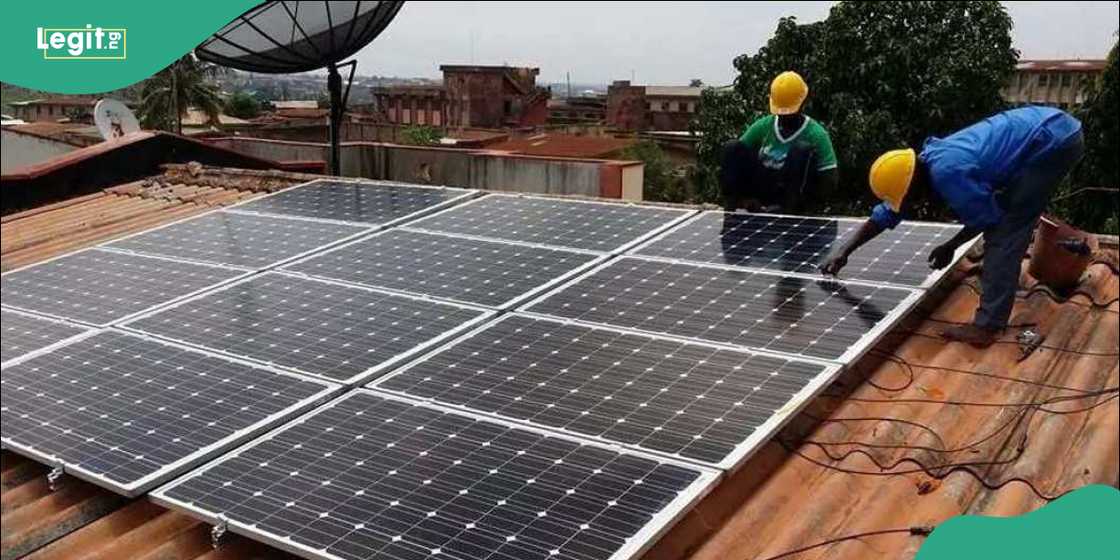-
LPV Technologies has inaugurated a new solar panel plant in Lagos with aims to enhance domestic manufacturing and decrease dependence on imported products.
-
The firm thinks that domestically produced solar panels, along with other power sources such as natural gas, could address Nigeria’s electrical supply issues.
-
The facility includes state-of-the-art automation and quality assurance measures, boasting an existing output of 100 megawatts and intentions for further growth.
The journalist from ecosundiaries.com.ng, Victor Enengedi, boasts more than ten years of expertise in reporting on energy issues, small and medium-sized enterprises (SMEs), technology, banking, and economic matters.
LPV Technologies, a Nigerian firm specializing in solar energy solutions, has inaugurated a new solar panel manufacturing plant in Lagos. The company is appealing to the government to prohibit the importation of solar panels with the aim of fostering domestic production.
In Nigeria, energy shortages are prevalent since approximately 60% of the nation lacks access to electricity. Solar power emerges as an excellent alternative, particularly beneficial for remote regions.

LPV’s new facility set to enhance Nigeria’s solar sector
Yinka Adelodun, who serves as the Executive Director at LPV Technologies, stated that the newly constructed facility aims to address significant issues within the renewable energy industry, including supply chain bottlenecks and excessive dependence on foreign-made panels.
The factory is situated in Ikotun, Lagos, close to the Synagogue Church of All Nations, established by the late Pastor T.B. Joshua. Recently, the firm inaugurated this site and provided an extensive tour to highlight its facilities.
The construction of the factory began almost two years ago as part of the company’s initiative to boost solar energy utilization in Nigeria. LPV Technologies feels that manufacturing solar panels domestically and integrating solar power with other energy sources such as natural gas represents the most effective approach to ensuring consistent electricity supply.
Punch reported that Adelodun stated that although numerous individuals opt for solar panels as an immediate remedy, the genuine approach involves harnessing both solar energy and natural gas to ensure sustainable economic growth.
The government has implemented strategies like the National Renewable Energy and Energy Efficiency Policy along with the National Renewable Energy Action Plan to promote the adoption of solar power.
Joint ventures between public and private sectors along with global cooperation are also aiding in the development of solar initiatives.
Recently, the federal government disclosed intentions to halt the importation of solar panels with the aim of promoting domestic production and endorsing Nigeria’s transition towards renewable energy sources.
The Ministry of Finance, CREDICORP, and the Presidential Initiative on Compressed Natural Gas Ltd jointly introduced the Credit Access for Light and Mobility Fund aimed at providing affordable financing options for adopting solar power as well as converting vehicles to use compressed natural gas.
Challenges in the sector
Adelodun highlighted that a significant challenge within the sector is the extended delays experienced with imported solar panels. These issues typically stem from holdups at customs or difficulties related to storing the products upon arrival.
Through local production of panels, the firm gains control over the supply chain and maintains strict quality standards.
During the tour, company officials demonstrated the manufacturing process, highlighting the use of advanced automation and strict quality control measures to meet international standards.

The manufacturing process at LPV Technologies incorporates PERC technology and is capable of producing panels with wattage capabilities between 550 watts and 720 watts. Presently, their facility has an output capacity of 100 megawatts, with expansion initiatives set for when demand rises.
Juwon Solarin, the Head of Business Development and Marketing, said the company is working to grow its distribution network and attract more partners to promote locally made solar panels.
Budget-friendly solar panels as a transformative solution
Inexpensive solar panels could make a significant difference for Nigerians facing the challenges of their nation’s inconsistent power grid.
Due to common power outages and electricity grid failures, numerous homes and establishments rely on costly diesel and gasoline generators for their energy needs.
If solar panels grow more affordable, however, an increasing number of Nigerians could produce their own power, thereby lessening reliance on the unreliable electrical grid. Such progress would enhance productivity, decrease energy expenses, and spur economic expansion.
The administration ought to back domestic solar production and provide rewards to facilitate wider adoption of solar technology.
Access Bank introduces solar energy financing initiative
Access Bank has launched a solar energy financing initiative aimed at enhancing sustainable electricity solutions within Nigeria’s healthcare industry.
According to
ecosundiaries.com.ng
The bank initiated the “Solar for Health” initiative aimed at assisting hospitals, laboratories, and various medical institutions in decreasing their significant reliance on non-renewable energy sources.
This program offers accessible financial solutions for setting up solar power installations.